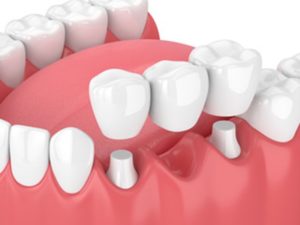
Dental bridges are an incredibly effective method for replacing missing teeth—these handy little bridges are able to easily restore two or three lost teeth in a row, making them an excellent option for many patients. However, they aren’t perfect and aren’t meant to last forever; even with proper care, they usually last for 10 or 15 years before needing to be replaced. That said, it’s important to be mindful of some of the things that could potentially trigger dental bridge failure. Keep reading to learn more about some of the things that cause bridges to fail along with some tips for preserving them.
Why Do Dental Bridges Fail?
Although there are several reasons for dental bridge failure, a few of the common reasons include:
- Poor oral hygiene – This is perhaps the leading cause of dental bridge failure; poor oral hygiene will often result in all sorts of oral health issues, including tooth decay that can affect and weaken the teeth surrounding your bridge.
- Bad habits – Biting into hard objects, clenching your teeth, and smoking or using tobacco products can all be hazardous for your bridge.
- Inadequate support – Your bridges must have enough support from your jawbone in order to function properly; sometimes dental implants can facilitate this.
- Cheap materials – If your bridges are made of cheaper materials, they won’t be as durable as high-quality bridges and will be more susceptible to failing.
- Skipping dental visits – Your bridges need professional care and attention, and your dentist can check their integrity to ensure they’re working as intended before problems start to develop.
Tips for Preventing Dental Bridge Failure
Part of preventing dental bridge failure is knowing what warning signs to look for! Be mindful of the following:
- Tooth or gum sensitivity near your bridge.
- Chips, cracks, or any noticeable damage in your bridge.
- Pain when biting, chewing, or brushing around your bridge.
- Your bridge feels loose.
However, the absolute best way to prevent dental bridge failure is by practicing good oral hygiene. Your bridge doesn’t need any specialized care on your part—brushing your teeth twice a day, flossing, and using an antibacterial mouthwash will contribute towards a clean mouth and an uncompromised bridge. Visiting your dentist regularly is crucial too. Plus, they’re a fantastic resource for additional information about your bridges and how to preserve them.
Dental bridges are among the best options for replacing missing teeth—but you don’t want to have to replace your replacement! That said, knowing what expedites dental bridge failure and taking steps to prevent it will ensure that your bridge does its job and helps to give you a complete and beautiful smile.
About the Practice
Rockville Family Dentistry proudly serves the dental needs of the Rockville community under the leadership of Dr. Shahram Modarres. Dr. Modarres received his dental doctorate from the New York University School of Dentistry and has taken countless hours of continuing education in a wide variety of fields. His practice is pleased to offer several available services including dental bridges. If you have any questions about the article or would like to schedule a visit, you can contact the practice online or over the phone: (301) 816-9400.

